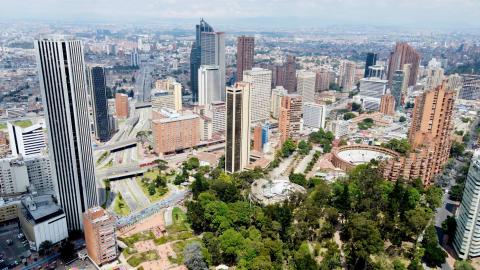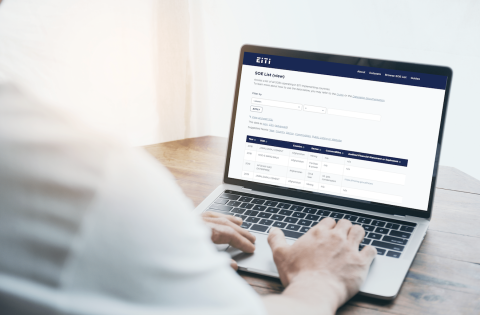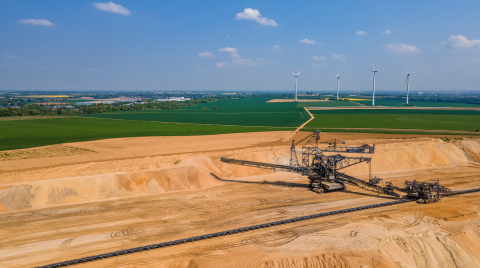
Myanmar EITI: SOE reforms underway in the extractives sector
State-owned enterprises (SOEs) play a central role in Myanmar’s economy. According to the latest EITI Report, nearly 80% of extractives revenues are collected by SOEs, predominantly from the oil and gas sector. EITI reporting sheds light on a recent reform to improve the transparency on how these revenues are managed.
Since Myanmar began implementing the EITI in 2014, EITI reporting has played an important role in providing data to inform extractives sector reforms. The Myanmar government's 12-point Economic Policy underscores the strategic role of EITI in the reform process, and the EITI has been a platform for debate on issues such as revenue sharing, revenue management and SOEs. The country’s Sustainable Development Plan, which provides a long-term vision for how Myanmar can achieve inclusive economic growth and prosperity for all its citizens, references the EITI as a central process for achieving a “prudent and transparent management of natural resources revenue.”
In March this year, Myanmar EITI (MEITI) released its 2017-2018 EITI Report. One of the most interesting developments highlighted in the report concerns a recent reform to abolish opaque accounts held by SOEs. These accounts garnered much attention when they appeared in Myanmar’s first EITI report from 2013-2014, and have since continued to be a matter of public interest and debate.
Pulling back the curtain on SOE revenues
In many countries, SOEs contribute a significant portion of their extractives revenues to government treasuries. Yet Myanmar's first EITI Report, published in 2015, disclosed that more than 50% of revenues collected by SOEs were kept in separate “Other Accounts” rather than being transferred to the State Budget. These Other Accounts – also called Union Fund Account-Other Accounts (UFA-OAs) – are separate bank accounts held by each SOE to retain a portion of their net profits. To improve the transparency of the revenue flows of SOEs and of the budgeting process, the report recommended that the Ministry of Finance (now the Ministry of Finance, Planning and Industry) consider whether revenues collected by SOEs from the extractives sector could be recorded as revenues in the budget. It also recommended that more information be disclosed with regards to Other Accounts in the budget.
Subsequent EITI Reports have noted that a significant portion of total extractives revenues from SOEs have been accumulating in their Other Accounts, without much clarity on the rules for retention and spending. This includes profitable SOEs, who have been allowed to keep large revenues in their Other Accounts, without clear regulations on what they can do with those funds.
The latest EITI Report reveals that Myanmar’s largest operating SOE, Myanmar Oil and Gas Enterprise (MOGE), transferred about USD 504 million into its Other Accounts in fiscal year 2017-2018. That same fiscal year, the closing balance of this same account was USD 4.6 billion, more than six times the total revenue of just over USD 727 million collected from oil and gas companies for the same fiscal period.
Abolishing Other Accounts for better public oversight
Responding to recommendations in EITI Reports and calls for more transparency around Other Accounts, the government of Myanmar has undertaken various reform measures to improve SOE transparency. In 2019, the government issued a directive to abolish the contentious Other Accounts, ordering that all revenues from SOEs are to be transferred to the State Budget from fiscal year 2019-2020 and onwards. Following this government order, Other Accounts will be closed and all revenues from SOEs will need to be recorded in the national budget, which will allow for greater public oversight.
The directive to close Other Accounts is part of a larger SOE reform process which is one of the main priorities of Myanmar EITI. Noting the role that MEITI plays in informing these reforms, Deputy Minister of Planning, Finance and Industry and MSG Chairman H.E U Maung Muang Win stated:
“To achieve our Sustainable Development Goals, Myanmar is committed to meet the requirements of the EITI Standard, including addressing SOE governance issues. The decision that has been made to close all UFA-OAs is an important step in this direction, and we hope to use the EITI process to further address transparency measures through our SOE reform.”
Next steps for SOE transparency
The Validation of Myanmar in October 2019 recommended further improvement in SOE governance, including ensuring that all transfers from government to SOEs are comprehensively and publicly disclosed through government platforms. Myanmar is also encouraged to provide further clarity around in-kind payments by SOEs, and the participation of two major military holding companies, Myanmar Economic Corporation (MEC) and Myanmar Economic Holding Limited (MEHL). The MSG is currently working on addressing these recommendations ahead of the country’s second Validation, scheduled to start in April 2021.
Resources
Contenido relacionado





